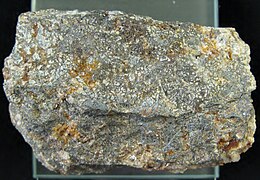Bismutite
Appearance
(Redirected from Bismuthite)
| Bismutite | |
|---|---|
 Bismutite from Schneeberg, Germany | |
| General | |
| Category | Carbonate mineral |
| Formula (repeating unit) | Bi2(CO3)O2 |
| IMA symbol | Bit[1] |
| Strunz classification | 5.BE.25 |
| Dana classification | 16a.03.05.01 |
| Crystal system | Orthorhombic |
| Crystal class | Pyramidal (mm2) (same H-M symbol) |
| Space group | Immm |
| Unit cell | a = 3.865 Å, b = 3.862 Å, c = 13.675 Å; Z = 2 |
| Identification | |
| Color | Yellow to brown, greenish, green-grey, grey or black |
| Crystal habit | Very rare as platy crystals; typically radially fibrous to spheroidal, in crusts and earthy to dense massive aggregates |
| Twinning | pseudo-merohedral twinning simulates tetragonal symmetry |
| Cleavage | Distinct/Good on {001} (microscopically observable) |
| Mohs scale hardness | 2.5 – 3.5 |
| Luster | Vitreous, waxy, may be dull to earthy |
| Streak | Grey |
| Diaphaneity | Opaque to transparent in small grains |
| Specific gravity | 6.7 – 7.4 measured, 8.15 calculated |
| Optical properties | Biaxial (−) (appears uniaxial due to twinning) |
| Refractive index | a=2.12–2.15, b=2.12–2.15, g=2.28 |
| Birefringence | 0.1300–0.1600 |
| 2V angle | 45 |
| References | [2][3][4][5] |
Bismutite or bismuthite is a bismuth carbonate mineral with formula Bi2(CO3)O2 (bismuth subcarbonate). Bismutite occurs as an oxidation product of other bismuth minerals such as bismuthinite and native bismuth in hydrothermal veins and pegmatites.[3] It crystallizes in the orthorhombic system and typically occurs as earthy to fibrous masses.[2]
It was first described in 1841 for an occurrence in Saxony.[2]
The term bismuthite has been used in the past for bismuthinite.[6]
References
[edit]- ^ Warr, L.N. (2021). "IMA–CNMNC approved mineral symbols". Mineralogical Magazine. 85 (3): 291–320. Bibcode:2021MinM...85..291W. doi:10.1180/mgm.2021.43. S2CID 235729616.
- ^ a b c Webmineral
- ^ a b Mindat
- ^ Handbook of mineralogy
- ^ Grice, Joel D., A Solution to the Crystal Structures of Bismutite and Beyerite, The Canadian Mineralogist, Vol. 40, pp. 693–698 (2002)
- ^ Chisholm, Hugh, ed. (1911). . Encyclopædia Britannica. Vol. 4 (11th ed.). Cambridge University Press. p. 11.
